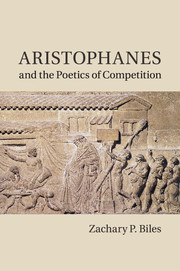Book contents
- Frontmatter
- Contents
- Acknowledgments
- List of abbreviations
- Introduction: proagon
- 1 From Thamyris to Aristophanes: the competitive poetics of the comic parabasis
- 2 The competitive partnership of Aristophanes and Dikaiopolis in Acharnians
- 3 Aristophanes' poetic tropaion: competitive didaskalia and contest records in Knights
- 4 Intertextual biography in the rivalry of Cratinus and Aristophanes
- 5 Aristophanes' Clouds-palinode
- 6 Dionysos and Dionysia in Frogs
- Bibliography
- General index
- Index of passages
2 - The competitive partnership of Aristophanes and Dikaiopolis in Acharnians
Published online by Cambridge University Press: 25 January 2011
- Frontmatter
- Contents
- Acknowledgments
- List of abbreviations
- Introduction: proagon
- 1 From Thamyris to Aristophanes: the competitive poetics of the comic parabasis
- 2 The competitive partnership of Aristophanes and Dikaiopolis in Acharnians
- 3 Aristophanes' poetic tropaion: competitive didaskalia and contest records in Knights
- 4 Intertextual biography in the rivalry of Cratinus and Aristophanes
- 5 Aristophanes' Clouds-palinode
- 6 Dionysos and Dionysia in Frogs
- Bibliography
- General index
- Index of passages
Summary
Among the things for which Pericles congratulates his fellow Athenians in his funeral oration is the number of festivals they celebrated during the year. With contests and sacrifices (Th. 2.38 ἀγῶσι μέν γε καὶ θυσίαις), he says, these occasions provided a pleasure (τέρψις) that momentarily banished day-to-day hardships (τὸ λυπηρόν). During the cold, rainy months of winter, the various Dionysian festivals that extended from December through March must have been a major source of communal and personal joy. Although in the case of the dramatic contests the terpsis to which Pericles alludes may have derived from the audience's simple enjoyment of the individual productions, it is also certain that the Athenians were invested in the outcome of the competitions themselves. Plato condemns the kind of “theatrocracy” that came to dominate the poetic agon, and Plutarch recalls an occasion when the audience was heatedly divided in their support of Aeschylus and the young Sophocles, leading the presiding archon, in a moment of administrative inspiration, to adapt festival protocol by replacing the normal ten judges with the ten generals in order to lend authority to a decision that would inevitably meet with disapproval from a large segment of the audience.
Aristophanes would not disappoint his audience's festive expectations at the Lenaia of 425, where comedy appears to have been the privileged genre. Acharnians caters fully to Athenian pride in the festival celebrations, by including within its plot not one but two festivals of Dionysos, the Rural Dionysia and the Anthesteria.
- Type
- Chapter
- Information
- Aristophanes and the Poetics of Competition , pp. 56 - 96Publisher: Cambridge University PressPrint publication year: 2011
- 1
- Cited by

